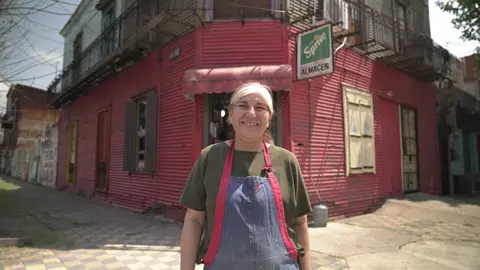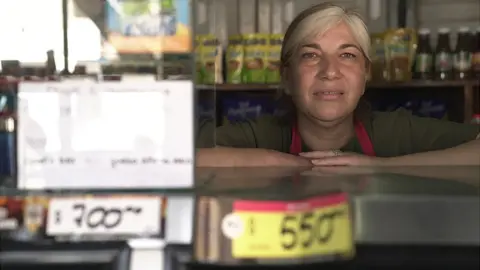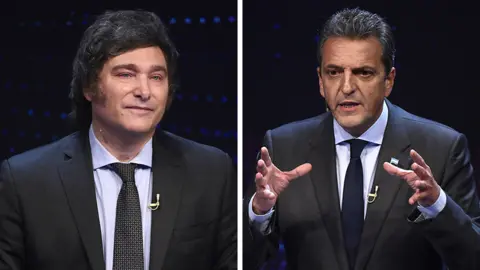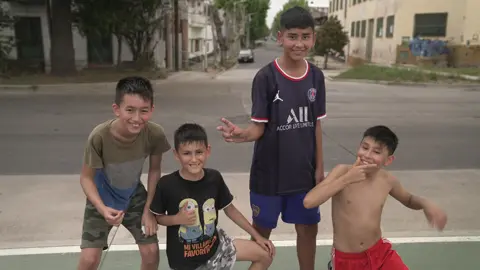Will Argentina vote in a radical politician to fix the economy?
 BBC
BBCThere is everything to play for in this weekend's presidential run-off. Few Argentines saw radical candidate Javier Milei coming until he won the primaries in August.
He may have been pipped to the post by left-wing Economy Minister Sergio Massa in last month's first round but now polls put the two candidates neck-and-neck ahead of the decisive run-off vote.
One thing that is certain is that the economy will be the key factor in this election, which comes at a time of deep economic crisis for Argentina.
With inflation now topping an annual 140%, fixing the country's finances is top of the agenda for voters and candidates alike.
"I personally have a little notebook with names of people who can't make ends meet and I give them items on credit," says Lourdes Monjes, who runs a corner shop in the poor Buenos Aires neighbourhood of Isla Maciel.
She has seen things get harder, especially in the past few years. "My clients pay me back and then they end up owing again, so it's a vicious cycle they can't get out of," she says.

Isla Maciel sits in the shadow of Argentina's largest port, its houses made of wood and corrugated iron.
On the walls there are murals of Juan Perón, after whom the populist political movement Peronism is named and whose wife Evita was hailed as a champion of the poor.
With 40% of Argentines now living in poverty, many are desperately looking for another saviour.
Sergio Massa, the economy minister in the outgoing Peronist government, is promising to move mountains to improve Argentina's finances.
His critics point out that it was under his leadership that the economy slumped to its current depths and that he therefore cannot be trusted with its recovery.
But his supporters say he is a seasoned politician who can accomplish much if given a chance to steer things his way.
The other choice is Javier Milei - a political outsider who has proposed drastic changes like abolishing the central bank and replacing the peso with the dollar. He also wants to liberalise gun laws and restrict abortion rights.
With increasing hardship among Argentina's population, there is also a growing appetite for radical change - and that is why far-right Javier Milei's profile has soared.
In the final TV debate between the two candidates last weekend, he made the case for shaking up the status quo. "Ask yourself if you prefer inflation over stability, if you prefer this decline in production and employment or if you prefer economic growth," he said.
 Getty Images
Getty ImagesThe other option, he said, was "supporting this corrupt, parasitic and useless political caste, that just destroys our wealth generation and sinks us deeper and deeper".
Mr Milei's style has captured people's attention.
He describes himself as an "anarcho-capitalist" and at one campaign event he wielded a chainsaw to symbolise his plan to slash government spending.
He has been compared to former US President Donald Trump - and closer to home - to Brazil's former leader, Jair Bolsonaro.
"From an economic point of view, they are very similar because they have this idea that the markets solve everything and the state is not necessary," says economist Paulo Feldman from the University of São Paulo of the parallels between Mr Bolsonaro and Mr Milei.
"You don't need to plan, you don't need to have government, you don't need rules," Mr Feldman says of Mr Milei's proposals.
But the academic says that that is not a viable programme: "We know that this is not true. There is no country, no developed country that [carries out] this stupidity."
Mr Feldman's views are shared by many other economists. Earlier this month, more than 100 wrote an open letter warning that voting in Mr Milei would spell economic disaster for Argentina.
Nervousness around Mr Milei's brash campaign and lack of experience is something Sergio Massa is trying to use to his advantage. "I know there are some who are voting for me not because they are convinced but just as a way to avoid choosing a path of violence, hatred and harm," Mr Massa said in Sunday's debate. "I will ensure they feel that their vote wasn't wasted."
Whoever wins, the next president will have a challenge on his hands.
"Whatever comes next is going to be tough," says political analyst Ana Iparraguire of the difficulties of lifting Argentina out of its economic hole. "It's going to require adjustments, budget cuts, reducing state expenses and that is going to come at a high cost, so we are going to have to wait and see how far each of them are going to go."

Back at the port, a group of young boys are kicking around a ball in the street. In the distance are stacks of shipping containers.
These youngsters live in the shadow of one of Argentina's economic engines - yet their lives are far removed from any of its benefits.
Several of the young footballers are wearing T-shirts with Lionel Messi's name emblazoned on the back. Argentina is not short of sporting heroes - but people here say what they need is political heroes to pull the country out of this deep crisis.
